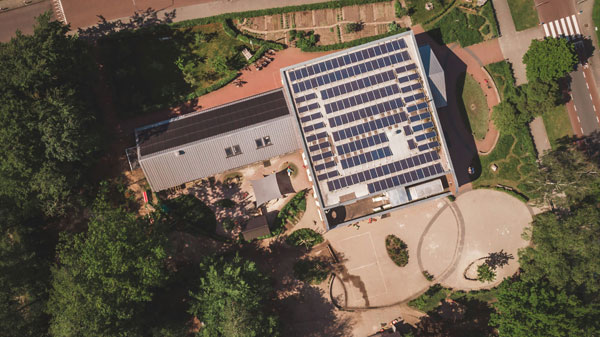Climate change demands a new approach to education

[A school with solar panels and green spaces. Photo credit to Unsplash]
A global survey found that 59% of young people aged 16–25 were very or extremely worried about climate change, with over 50% reporting negative emotions like sadness, fear, and anxiety.
The findings demonstrate that just learning the facts isn’t enough, experts say.
The survey results signal an urgent need for schools to go beyond traditional lessons and equip students with skills to navigate a rapidly changing world.
As the planet gets warmer and climate problems become more serious, education specialists argue that schools should prepare students not only for future jobs but also for real-life challenges and decision-making in uncertain conditions.
“Education must fundamentally transform itself to address the climate crisis,” said Alexander Leicht, Chief of the Section of Education for Sustainable Development at UNESCO.
At present, most science curricula teach climate change through facts and figures, including rising CO₂ levels, melting glaciers, and extreme weather events.
However, experts note that awareness of these problems does not necessarily lead to meaningful action on climate issues.
They argue that schools should emphasize critical thinking, problem-solving, adaptability, and systems thinking.
These skills help students understand complex environmental challenges.
The North American Association for Environmental Education defines climate literacy as understanding how climate affects society and how social, economic, and political systems influence the environment.
This includes awareness of environmental justice and green career pathways in sustainability.
For instance, a drought in one part of the world can create global food shortages, trigger migration, and increase social and political instability in other countries.
The growing focus on climate education also highlights potential career opportunities.
The United Nations estimates that 30 million jobs could be created by 2030 in clean energy, efficiency, and low-emission technologies, offering students future career opportunities.
Innovative approaches such as project-based learning are gaining attention from educators worldwide, as they allow students to apply knowledge to real-world challenges.
Some schools have introduced sustainability projects like solar panel installations, energy-efficient building initiatives, and zero-waste campaigns, effectively turning campuses into “living laboratories” for environmental solutions.
These efforts not only help schools reduce operational costs but also teach practical skills while fostering collaboration, creativity, and leadership among students.
Global initiatives reinforce the importance of climate-focused education.
The Villars Institute, for example, advocates long-term thinking and cross-disciplinary collaboration in education, while youth-led efforts like Fridays for Future, founded by Greta Thunberg at age 15 demonstrate how students can influence both local and international climate policy.
Experts suggest that traditional school subjects be reimagined to integrate climate concepts.
In math classes, for example, students can calculate carbon footprints and energy consumption; in literature, they could examine stories that reflect humanity’s relationship with nature; and in sports science, they could study the emissions from travel, stadium operations, and equipment production.
“Education that connects real-world issues with classroom learning will prepare students for the future,” said Sophie Hill, a former Brigham Young University postdoctoral researcher.
According to UNESCO, most young people believe that climate education in schools should be strengthened to provide them with practical knowledge and tools for action.
Advocates argue that updating school programs now could help future generations not only understand climate challenges but also develop the confidence and problem-solving skills necessary to take meaningful action.

- Egshig Nandinbold / Grade 11
- UWC Atlantic School

![THE HERALD STUDENT REPORTERS [US]](/assets/images/logo_student_us.png)
![THE HERALD STUDENT REPORTERS [Canada]](/assets/images/logo_student_ca.png)
